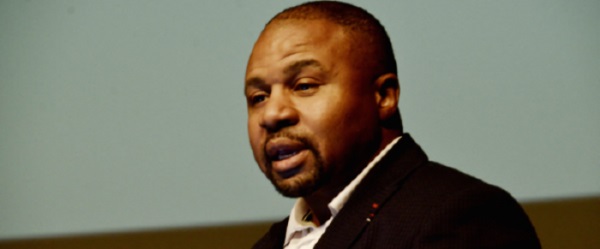Wayne State has unique ability to advance racial justice, diversity experts say at Social Work event

Wayne State can be instrumental in advancing racial justice by training community organizers and policymakers and by creating a learning environment that helps minorities overcome traditional barriers to success, diversity experts told the university community on March 31.
During an afternoon program on racial justice organized by the Wayne State School of Social Work and the university's Academic Staff Professional Development Committee (ASPDC), five speakers explored ways to address the national rise in violence, police use of force, and unrest on college campuses. The program began in the Community Arts Auditorium with the School of Social Work's 10th Annual Diversity Lecture, delivered by national policy expert John H. Jackson, and concluded in Alumni House, where ASPDC hosted four Wayne State officials in a panel discussion on ways to foster diversity and success in the student body.
Jackson, who is president and CEO of the Cambridge, Mass.-based Schott Foundation for Public Education and has advised the Clinton and Obama administrations on educational policy, told the Community Arts audience that because of Wayne State's urban location and mission, other Michigan universities "cannot do for Detroit what Wayne State can. Your very presence here makes you ministers of justice."
Human biology is the same across races and ethnicities, Jackson noted, therefore "any variance identifiable by race or ethnicity is caused by social policies and practices. Organizing is about understanding who is most influenced by these policies and practices" and pursuing systemic changes that create opportunities for these individuals. In the case of education, he said, this might include working to eliminate high student suspension and expulsion rates through positive behavior initiatives and restorative justice programs, which empower students to resolve conflicts on their own and in small groups.
Jackson stressed that sound policy "should not create a new dominant group" but rather establish "a dynamic where all individuals have a fair and substantive opportunity. The goal should be to eliminate racially identifiable outcomes."
The panel discussion that followed at Alumni House examined what this dynamic might look like at Wayne State. Moderated by Marquita Chamblee, Wayne State associate provost for diversity and inclusion and chief diversity officer, the panel consisted of Leonard Savala, director of the WSU Office of Multicultural Student Engagement, Mark Jackson, director of Wayne State's APEX Scholars, and Blanche Cook, assistant professor at the Wayne School of Law.
The panelists identified a number of barriers to success that minority students experience when matriculating, including homeless and financial hardship, lack of social capital, a fear of being perceived as "selling out" by attending college or of being weak by asking for help navigating the system, psychological stress from internalizing the "status quo" presented in mostly white classrooms, and even competing obligations presented by work and family. College success can be a form of activism for minorities, they argued, but it requires culturally sensitive support. Specifically, they said, minority students benefit from small classes with study groups and curricula emphasizing dialogue, campus-based discussion groups, early introduction to career services and internships, travel abroad opportunities, and access to mentors and role models "" particularly ones who have made and overcome mistakes.
Panelists also emphasized the importance of interdepartmental collaboration, noting that university resources can be stretched further when programs assisting veterans, foster youth, minorities, and other students populations work together to assist students who identify with more than one of these groups.